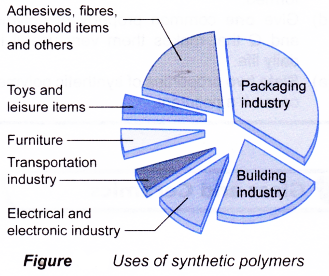Justify the uses of synthetic polymers in daily life
Synthetic polymers in daily life:
- Synthetic polymers have been widely used to replace many other building materials such as stones, metals, wood, clay, cotton, wool and natural rubber.
- Synthetic polymers are very stable. Unlike metals, wood or paper, they do not rust, rot or decay easily in the presence of water, oxygen or other chemicals or in sunlight.
- Figure shows the various uses of synthetic polymers.

- One of the advantages of synthetic polymers is that they can be made with special properties to suit the job required. They are chosen for the job because they have a suitable combination of properties.
- The following are the typical properties of synthetic polymers:
(a) Chemically stable
(b) Mostly are soft and flexible but some are hard
(c) Non-flammable
(d) Low density
(e) Relatively cheap
(f) Easy to mould or shape
(g) Can be coloured easily - The stable property of synthetic polymers makes them very useful, but this also means that they are difficult to dispose of as they are not easily biodegradable.
- The wide usage of non-biodegradable synthetic polymers with their properties has created pollution on our environment. They pollute our land, water and air.
- Land
Non-biodegradable synthetic polymer wastes will block or clog up the drainage system, thereby causing flash flood. Plastic containers which are not properly disposed of will become breeding ground for mosquitoes which will cause the spread of diseases such as dengue. - Water
The waste pollutes lakes and rivers with chemicals, causing the water not suitable for aquatic organisms to live in it. - Air
The open burning of synthetic polymers gives out harmful, pungent, acidic and poisonous gases that pollute the air. It causes green house effect and acid rain problems. - The main source for the raw materials of plastic is the products of petrochemicals obtained from petroleum. Petroleum is depleting and non-renewable.
- Synthetic polymers with all their diverse chemical properties together with their durability, light weight and ease of fabrication are certainly a material that modern society cannot live without.
- Although synthetic polymers cause environmental problems, we can still continue using them but in a wiser manner. This is because these problems are not caused by the polymers but the irresponsible attitude of society.
- There are a number of ways to solve the problems caused by the use of synthetic polymers.
(a) Recycle
(b) Reuse
(c) Find alternative to non-biodegradable synthetic polymers
(d) Proper way of disposal of unwanted synthetic polymers - Non-biodegradable plastic shopping begs and bottles are now replaced by biodegradable and photodegradable plastic.
- Recycling of synthetic polymers can be done by the following few steps:
(a) Collection of polymer waste
(b) Sorting of polymer waste
(c) Granulation
(d) Fabrication - Many plastic containers can be collected, cleaned and reused for a certain number of times. Used plastic materials can be converted into decorative items.
- We must have a proper way of disposal of unwanted synthetic polymers. Burning plastics waste in incinerator will reduce the escape of the toxic gas into the atmosphere. Burying of waste plastics is a cheaper option to dispose plastics but they take a long time for microbes to break them down. Waste plastic can be disposed by pyrolysis, a process of heating the plastic wastes in the absence of air to break them down. This will prevent toxic gases from escaping to the atmosphere.
People also ask